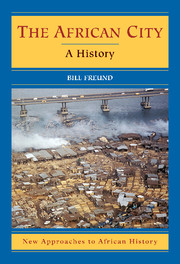Book contents
- Frontmatter
- Contents
- PREFACE
- 1 Urban Life Emerges in Africa
- 2 African Cities and the Emergence of a World Trading Economy
- 3 Colonialism and Urbanisation
- 4 Cities in Revolt: The Long-Term Crisis of South African Urbanism
- 5 The Post-Colonial African City
- 6 Globalisation and the African City: Touba, Abidjan, Durban
- INDEX
6 - Globalisation and the African City: Touba, Abidjan, Durban
Published online by Cambridge University Press: 05 June 2012
- Frontmatter
- Contents
- PREFACE
- 1 Urban Life Emerges in Africa
- 2 African Cities and the Emergence of a World Trading Economy
- 3 Colonialism and Urbanisation
- 4 Cities in Revolt: The Long-Term Crisis of South African Urbanism
- 5 The Post-Colonial African City
- 6 Globalisation and the African City: Touba, Abidjan, Durban
- INDEX
Summary
Descriptions of African cities in desperate conditions are generally coupled with assumptions about globalisation, a term that became fashionable in the course of rapid international economic growth in the 1990s. Globalisation can work as a term if we posit that it represents a stage in international economic interactions. It has gone together with an intensive increase in networking through telecommunications and the large-scale use of computers, with the dominance of big multinational corporations that deploy investments, production, and other activities relatively freely to desirable corners of the globe. Linked to globalisation and given the end of the Cold War, there has come an allied emphasis on international governance intended to ease the flow of goods and currencies amongst other forms of regulation.
For the globalisation champions, Africa has fallen off the map of the civilised world. With its poor infrastructure, its chaotic politics, not infrequent episodes of natural disaster causing havoc, and its continued dependence on primary product sales as its only desirable exports, it has been marginalised in the networked world. Where urban sociologists and geographers consider the fate of “world cities” that compete with and integrate largely with each other as national boundaries become less important, what is left for the cities of Africa? How Africans survive, form human communities, and access necessities in these cities is part of the picture which we have already considered in the last chapter.
- Type
- Chapter
- Information
- The African CityA History, pp. 170 - 198Publisher: Cambridge University PressPrint publication year: 2007

